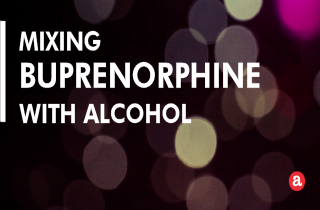ARTICLE OVERVIEW: Mixing buprenorphine with alcohol can cause respiratory depression that may result in death. Keep reading to learn more about the side effects of combining buprenorphine and alcohol.
TABLE OF CONTENT:
- Why Mix the Two?
- Effects on the Brain
- Self-Reports
- Side Effects
- Dangers
- Overdose
- Deaths
- Safety Guidelines
- Signs You Need Help
Why Mix the Two?
Buprenorphine is an opioid drug used for two reasons:
- As a painkiller.
- To treat stronger drug addiction.
It is one of the main active ingredients in the brand name medications Subutex and Suboxone. So when you’ve been prescribed buprenorphine, is it OK to drink at the same time?
As with other opioids, mixing buprenorphine with alcohol provokes dangerous side effects. In fact, buprenorphine stays in your system for at least a few days after ingestion. So, it’s important that you know how to use the medication correctly.
We discuss the effects of mixing alcohol and buprenorphine below. Then, if you have any questions about these two depressant drugs, please leave them in the comment section and we’ll try to respond to you promptly.
Effects on the Brain
Buprenorphine is a long-acting, partial mu agonist and full kappa antagonist. It binds with specific receptors in the central nervous system to manage withdrawal and cravings for stronger drugs like heroin. So, it is considered to be a safe medication.
But, is it safe to mix with alcohol?
NO!
Like other opioids, buprenorphine produces a sense of euphoria, slows down respiration, and sedates the user. These effects are consistent with other painkillers. However, recent recreational use of buprenorphine is on the rise. Alcohol can increase the euphoric feelings. But what happens when you mix buprenorphine and alcohol together?
When more than one central nervous system depressant is taken at one time, the effects of both are compounded. The effect is called “drug synergy”. Since both substances produce similar effects, combined together they create synergism. They actually build up their effects.
This is the case with combining alcohol with buprenorphine. Drinking while you are using this medication can have many negative side effects, including impaired cognition and slowed heart rate or breathing.
Self-Reports
What do users report in terms of effects when combining these two substances? People who have combined buprenorphine and alcohol and lived to tell the tale have reported these feelings:
- euphoria
- relaxation
- lightheaded
- numbness
However, recreational use and purposeful drinking while on opioid medications is incredibly risky. Dangers include overdose, intoxication, and brain damage. The most dangerous reported effect is slowed breathing, which lowers levels of oxygen to the brain. This involuntary effect – triggered by the synergistic effects of depressants – may require immediate medical attention.
Call 911 anytime you notice decreased rates of breathing or heart rate. These can be signs of an overdose.
Side Effects
In general, taking buprenorphine with alcohol may cause serious damage to your health. Some of the most common side effects include:
- blurred vision
- decreased motor coordination
- headache
- heart palpitations
- impaired thinking processes
- increased sweating
- nausea and vomiting
Because both substances cause similar effects, their combination can intensify each other effects. In other words, buprenorphine mixed with alcohol is a deadly cocktail.
Dangers
Since both buprenorphine and alcohol depress the central nervous system, taking them simultaneously increases the depressive effects of both substances. Combining these two can lead to:
- blood pressure problems
- dizziness
- drowsiness
- severe respiratory depression (slowed and/or difficult breathing)
- slowed heart rate
The approved FDA label for buprenorphine reads:
Buprenorphine in combination with benzodiazepines or other CNS depressants (including alcohol), has been associated with significant respiratory depression and death.
Moreover, the same label warns people that abuse of buprenorphine poses a risk of overdose and death, and the risk is higher if buprenorphine is abused with alcohol and other substances, especially benzodiazepines.
Mixing two depressants can cause respiratory depression.
Overdose
Buprenorphine is currently classified in the United States as a Schedule III controlled substance by the DEA. Though it has the potential to be addictive, medical professionals can still prescribe it for specific uses. So, when does overdose occur?
Overdose typically occurs when people try to use buprenorphine to get high. Snorting or injecting buprenorphine increase the potential for overdose, for example. In fact, the 2013 DAWN Report shows that Emergency Department visits involving buprenorphine increased drastically from around 3,000 in 2005 to over 30,000 visits in 2010. Most of the visits were classified as nonmedical use of medication. Moreover, the same report states that a combination of buprenorphine and alcohol was responsible for at least 1500 emergency room visits in 2010.
But that’s not all.
Taking buprenorphine with alcohol can greatly increase the risk of buprenorphine poisoning. In a scientific study on people who have died of buprenorphine poisoning, most blood concentrations of the medication were in therapeutic range. In other words, mixing alcohol and buprenorphine can still lead to death even without exceeding medical dosage.
Deaths
Death by painkiller drugs is a national issue. According to the Center for Disease Control statistics on drug overdose, almost 2 million Americans abused or were dependent on prescription opioids in 2014, while in 2016, more than 40 people died daily from overdoses involving Rx opioids.
One of the reasons a medical professional may prescribe buprenorphine is to treat opioid addiction. However, buprenorphine itself is an opioid and a narcotic. Some other narcotics cause greater respiratory depression than buprenorphine. However, combining this substance with other substances that depress the central nervous system, such as alcohol, can lead to death.
Safety Guidelines
Is is safe to drink when you’re taking buprenorphine?
No, it is not safe to drink while taking buprenorphine, or any other opioid for that matter. Drinking alcohol is not advised in either case: taking opioids for approved medical purposes or recreationally. The combination of these two depressant substances can lead to death.
If you have a prescription for buprenorphine, please use it as directed and consult your doctor if you have any questions about drug interactions. In order to protect yourself, SAMSHA shares some tips to avoid opoid misuse and overdose. These suggestions include:
- Use the medicine only as prescribed by your doctor.
- Do not take more medication than instructed.
- Do not take it more often than instructed.
- NEVER mix opioid medicines with alcohol, sleeping pills, or illicit substances.
- Store medicine safely where children and/or pets can’t reach it.
- Dispose of unused medication promptly.
Signs You Need Help
If you often drink and mix buprenorphine with alcohol, you may need help. First, get honest with yourself, and admit that a problem exists. Still not sure whether you have a problem, or not? Then, stop and answer these questions from the Drug Abuse Screening Test (DAST-10):
- Have you used drugs other than prescribed?
- Do you use more than one drug at a time?
- Are you able to stop taking drugs when you want to?
- Have you had blackouts as a result of your drug use?
- Do you feel guilty about your drug use?
- Do your loved ones complain about your drug use?
- Have you neglect your loved ones because of your drug use?
- Have you engaged in illegal activities to get your drug?
- Have you experienced withdrawal when you stopped using your drug?
- Have you had a medical problems as a drug use result?
If you answer ‘YES’ to one or more of these questions, you may need to seek professional help. Addiction specialists such as medical doctors, psychotherapists, licensed clinical counselors, and rehab staff can help assess you. Or you can always consult with your physician.
NOTE HERE: Substance use problems are treated medically. You are not alone. You can live a normal, drug-free life.
Still Got Questions?
Wondering about concurrent drug use and drinking?
If you would like to ask any questions about mixing any drug and alcohol, we invite you to post a comment in the section below. In fact, we love to hear from our readers! We respond to all legitimate queries personally and promptly. So, let us know more about your concern. We’ll try to help.










Related Posts